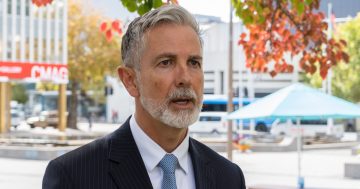
Doctors in training filled out the survey, which examined trends in workplace culture. Photo: File.
A national survey of doctors in training has scored the ACT worst on a wide range of criteria, including supporting staff well-being; tolerating bullying, harassment, discrimination and/or racism; and workplace culture.
The Medical Board of Australia and AHPRA (Australian Health Practitioner Regulation Agency) 2022 Medical Training Survey (MTS) asked doctors if they would recommend their current training and workplace, and how they rated the quality of their supervision, orientation, teaching sessions and training to raise patient safety concerns.
Medical Board of Australia Chair Dr Anne Tonkin said the report showed the culture of medical training “needs attention”.
“We can all be pleased that Australia continues to deliver high-quality medical training, producing doctors who provide high-quality medical care to patients in this country,” she said.
“But MTS results suggest that in 2022, things were not quite as good in medical training as they have been in previous years.”
In the ACT, 446 doctors in training took part in the survey.
Their responses included:
- 64 per cent agreed their workplace supported staff well-being; the national average was 77 per cent
- 61 per cent agreed there was a positive culture in their workplace; the national average was 77 per cent
- 69 per cent agreed bullying, harassment and discrimination by anyone wasn’t tolerated in their workplace; the national average was 79 per cent
- 29 per cent had experienced bullying, harassment, discrimination and/or racism in the past 12 months; the national average was 22 per cent
- 41 per cent had witnessed bullying, harassment, discrimination and/or racism in the past 12 months; the national average was 30 per cent
- 78 per cent agreed racism wasn’t tolerated in their workplace; the national average was 85 per cent
Shadow Health Minister Leanne Castley said these results were “unacceptable”.
“In the ACT, only a relatively small amount of training occurs outside public hospitals,” she said.
“So these results are another indictment of this government’s administration of our public hospitals.”
The MTS survey aligns with the final report into the implementation of the Independent Review into the Workplace Culture within ACT Public Health Services that showed there was still room for improvement, three years after the 2019 review.
This is despite all 20 recommendations from the 2019 culture review into ACT public health services, which was implemented to address the poor culture and behavioural issues present, being completed.
It highlighted “worrying and pervasive issues” such as poor behaviour, poor management and leadership, inefficient processes, inadequate training and prevalence of bullying, noting some of these issues had been present “for many years”.
The final report highlighted that while progress had been made, sub-cultures continued to exist, making it “difficult to progress” consistent system-wide culture reforms.
“Across the three ACT public health organisations, there has been steady improvement in cultural maturity and slight improvements in organisational trust,” the report stated.
“However, there remain significant percentages of staff not feeling engaged or who are actively disengaged with CHS [Canberra Health Services] and CPHB [Calvary Public Hospital Bruce].”
It noted “substantial improvements” in CHS with a reduction in bullying and harassment incidents from 44 per cent of staff surveyed in 2019 to 27 per cent in 2021.
However, it stated that more needed to be done to ensure middle managers and supervisors were supported to lead by example and empower staff to address poor behaviour.
“There remain poor workplace behaviours and building the capability of leaders and managers at all levels is required to exemplify and facilitate appropriate behaviour,” the report stated.
Health Minister Rachel Stephen-Smith said while the program had been completed, work would continue to drive positive cultural change across the public health system.
“The findings of this review show substantial progress has been made to improve workplace culture over what has been an exceptional period of challenges and pressure for all health systems,” she said.
“It also identifies areas for continued focus as all organisations embed cultural reform into their business-as-usual activities.”
Ms Stephen-Smith said ongoing work included finalising the system-wide workforce strategy, continuing leadership programs and measuring the progress of cultural improvement on a regular basis.



















